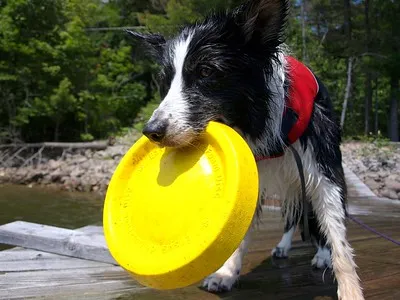
Adopting a dog is a profoundly rewarding experience, and while puppies often capture our immediate attention, there’s a special magic in welcoming a senior dog into your home. Specifically, Senior Border Collies For Adoption offer a unique blend of intelligence, loyalty, and a calm demeanor that can enrich any household. These distinguished companions, often overlooked, possess a wisdom and a gentle spirit that make them incredibly special. This program is dedicated to honoring their golden years and connecting them with loving forever homes.
The “Seniors for Seniors” program, established in memory of NEBCR’s devoted friend and long-time Border Collie rescue advocate, Pat Sides, aims to facilitate these heartwarming adoptions. This initiative waives the adoption fee for individuals aged 60 and above who choose to adopt a senior dog, defined as a dog aged 10 years or older. Furthermore, NEBCR generously covers all necessary veterinary care costs prior to adoption, ensuring these senior dogs are healthy and ready for their new lives. Donations are gratefully accepted to continuously support both senior dogs and the people who open their hearts to them.
Many senior dogs entering rescue programs have previously lived with elderly owners. These dogs are often accustomed to a quiet home environment, as their previous companions may have passed away or moved into assisted living facilities. This means they are typically well-adjusted to a peaceful setting and possess a calmer disposition. Older dogs, by nature, tend to be less demanding in terms of energy expenditure, making them an ideal match for individuals seeking a more tranquil home life.
Border Collies, known for their remarkable intelligence and high energy levels in their youth, often enjoy a long lifespan, frequently living well into their teens. These years are their golden years, and they deserve nothing less than the best love and care. By choosing to adopt an older Border Collie, you are making a significant positive impact on the world, offering comfort and joy to a deserving animal during their twilight years.
Senior dogs often possess endearing personalities and a wealth of life experience. Many volunteers within rescue organizations have personally experienced the joy of adopting a senior dog and found them to be incredibly endearing, entertaining, and full of a quiet zest for life. If you are a senior citizen yourself, we wholeheartedly encourage you to explore the “Seniors for Seniors” program and consider opening your heart and home to one of our wonderful senior Border Collies.
Five Great Reasons to Adopt a Senior Dog
The Unwavering Commitment to Every Dog
At NEBCR, we are immensely proud of our commitment to never turn away a dog based on illness or age. We firmly believe that every dog, regardless of their life stage, deserves to live a happy and fulfilling life. This philosophy is central to our mission, especially when it comes to senior dogs.
The average lifespan for a Border Collie is around 15 years, and with advancements in nutrition and veterinary care, many are now living even longer. This extended life expectancy means that senior Border Collies can continue to be incredible companions for many years. Unlike their younger counterparts who require vigorous exercise to burn off abundant energy, older Border Collies are often content with leisurely strolls or gentle games of fetch in the yard.
A significant advantage of adopting a senior Border Collie is their established “off switch.” They have typically learned to relax and settle wonderfully well in a home environment, content with simply being near their beloved humans. This makes them exceptionally adaptable and less disruptive to a household routine.
Senior dogs come into rescue for a variety of reasons, but their core need remains the same: a warm, safe, comfortable, and loving place to spend their retirement years. They have so much love to give and are eager to share their companionship.
We sincerely hope you will consider opening your heart and home to one of our remarkable senior dogs. Your decision to adopt not only changes their life but also enriches yours immeasurably. And if you have already opened your home to a senior dog, please accept our deepest gratitude for your kindness and compassion.
